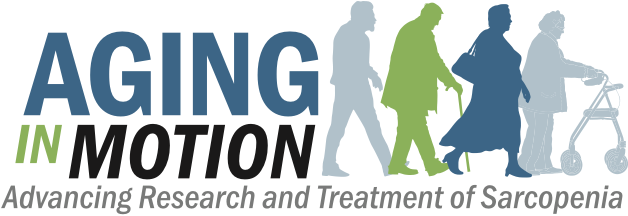Aging in Motion’s Science Advisory Board examines and advises on issues related to the current state of sarcopenia research and treatment.
Board Members
CHAIR: Jack M. Guralnik, M.D., Ph.D., MPH
Dr. Jack Guralnik spent 25 years doing epidemiologic research at the National Institute on Aging, NIH and was Chief of the intramural Laboratory of Epidemiology, Demography and Biometry. He has received multiple professional awards during his career. In 2005 he was awarded an Honorary Doctorate from the University of Tampere, Finland and in 2009 received the NIH Director’s Mentoring Award. He is Board Certified in Public Health and General Preventive Medicine.
William J. Evans, Ph.D.
William J. Evans, Ph.D., is Adjunct Professor in the geriatrics program at the Duke University Medical Center. His research is focused on protein and muscle metabolism, including optimal protein intake to enhance muscle building and prevent muscle loss.
Luigi Ferrucci, M.D., Ph.D.
Dr. Luigi Ferrucci is a geriatrician and an epidemiologist who conducts research on the causal pathways leading to progressive physical and cognitive decline in older persons. In September 2002, he became the Chief of the Longitudinal Studies Section at NIA and the Director of the Baltimore Longitudinal Study on Aging.
Roger A. Fielding, Ph.D.
Dr. Fielding is an internationally known researcher who studies the underlying mechanisms contributing to the age-associated decline in skeletal muscle mass, the resultant impact on function, and the potential role of exercise, nutrition, physical activity and other therapies on attenuating this process. He has published over 200 peer-reviewed papers with over 8,000 citations and has conducted numerous cross sectional, longitudinal, and intervention studies examining the role of skeletal muscle power on physical performance in older adults.
Linda P. Fried, M.D., MPH
Dr. Linda P. Fried, Dean of Columbia’s Mailman School of Public Health (since 2008) is a leader in the fields of epidemiology and geriatric medicine. Trained in cardiovascular and chronic disease epidemiology, she has dedicated her career to the science of healthy aging and prevention of frailty, disability and cardiovascular disease, and defining how to transition to a world where greater longevity benefits people of all ages.
Bret Goodpaster, Ph.D.
Bret Goodpaster, Ph.D. is the Director of the Exercise Metabolism Core and Senior Investigator at the TRI and Professor at the Sanford Burnham Prebys Medical Discovery Institute at Lake Nona. Dr. Goodpaster studies the role of exercise on energy metabolism in aging, obesity and diabetes. In his role at the TRI, he will help decipher biological mechanisms underlying the health benefits of exercise that can be translated back into new and better treatments for these conditions.
Tamara B. Harris, M.D., MSc.
Dr. Harris’ research interest focuses on lifelong patterns of daily activity and weight and how these contribute to weight related health conditions, change in body composition and health outcomes in old age. She is the principal investigator for the Health, Aging, and Body Composition Study and also the Age, Gene/Environment Susceptibility-Reykjavik Study, both of which are longitudinal studies of change in body composition in large older populations in the context of multi-morbidity.
Stephen Kritchevsky, Ph.D.
Dr. Kritchevsky is an epidemiologist specializing in nutrition, chronic disease and physical function in older adults. He has leadership positions in several multi-center observational studies and clinical trials focused on the functional health of older adults including the Lifestyle Interventions and Independence for Elders Clinical Trial, the Health Aging and Body Composition Study, the Cardiovascular Health Study – All-Stars Study, and the Look AHEAD Memory and Movement Study.
Jay Magaziner, Ph.D., M.S. Hyg.
Dr. Magaziner is a leading scholar and expert in the epidemiology of aging. He pursues research on aging in three interrelated areas: the consequences of hip fracture, health, and long-term care, and methods for studying older populations. The major focus of this work is on identifying ways to enhance functioning and improve the quality of life for older people. He has been continuously funded by the NIA since 1983 for studies on dementia in nursing homes and hip fracture outcomes.
Marco Pahor, M.D.
Dr. Pahor is the director of the University of Florida Institute on Aging, and the founding chairman of the department of aging and geriatric research in the UF College of Medicine. Pahor is an internationally recognized expert on population-based studies, clinical trials and multidisciplinary translational research in the fields of aging and disability. Dr. Pahor has an excellent publication record, having authored or co-authored more than 420 papers in leading peer-reviewed journals. He has an extensive portfolio of grants from the National Institutes of Health and other agencies, and is a leader in education, serving as director of faculty mentoring programs of the Claude D. Pepper Older Americans Independence Center.
Stephanie Studenski, M.D., MPH
Stephanie A. Studenski, MD, MPH, is one of the nation’s foremost authorities and researchers of mobility, balance disorders and falls in older adults. She has dedicated her career to researching and developing practical methods for health professionals to evaluate and treat older patients who may have difficulties with mobility and balance. Through her research, she strives to understand balance and mobility problems that occur with obvious conditions such as stroke, arthritis, Parkinson’s disease, and hip fractures as well as those that surface with other, less obvious conditions like peripheral neuropathy (numb feet), loss of peripheral vision or slowed reaction speed.
Bruno Vellas, M.D., Sc.D.
Prof. Bruno Vellas is Professor of Medicine and Chairman of the Department of Internal Medicine and Geriatric Medicine at the CHUT, and Chief of the Alzheimer’s Disease Clinical and Research Center at the University Hospital Center in Toulouse, France. Prof. Vellas is a member of the Faculty of Medicine at the University of Paul Sabatier in Toulouse, the Chairman of the International Academy on Nutrition and Aging, and Principal Investigator for the European Alzheimer’s Disease Consortium.
